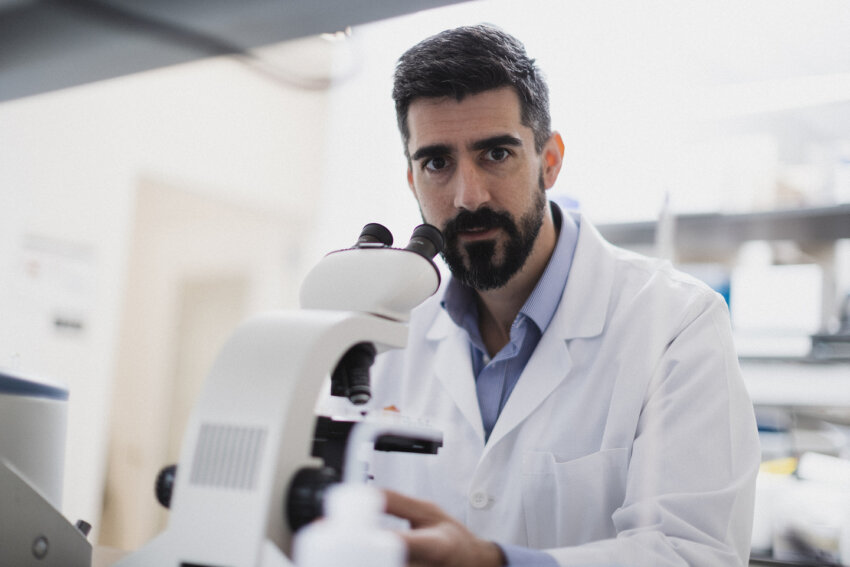The National Institutes of Health has awarded a four-year, $2.4 million grant to The University of Texas Health Science Center at San Antonio (UT Health San Antonio), which will work in collaboration with the American Dental Association Science & Research Institute (ADASRI) to conduct a clinical trial studying the responsible use of antibiotics in combination with other treatments for periodontal disease, commonly known as gum disease.
The study, funded by NIH’s National Institute of Dental & Craniofacial Research, will be led by principal grant recipient and investigator Georgios Kotsakis, DDS, MS, associate professor of periodontics at the UT Health San Antonio School of Dentistry. ADASRI chief executive officer Marcelo Araujo, DDS, PhD, will serve as co-investigator and collaborator.
The goal of the project is to generate real-world data on periodontal disease treatments that are supplemented by the use of antibiotics, otherwise known as adjunctive antibiotic therapy. The data will be collected by more than 30 clinicians who belong to the National Dental Practice-Based Research Network (PBRN), for the study titled, “Shaping the Indications for Periodontal Adjunctive Antibiotics in Dental Practice: A PBRN Clinical Trial.” The study will enroll 1,050 periodontal patients who receive dental care in practices across the country.
The clinicians will share clinical and patient-experience data about the efficacy of the antibiotics they administer, and the data could be used to develop evidence-based clinical guidelines that offer treatment alternatives and support antibiotic stewardship.
“ADASRI is thrilled to partner with as respected a researcher as Dr. Kotsakis on this important project,” Dr. Araujo said. “Antibiotic stewardship is one of the most important topics in dentistry today, and given Dr. Kotsakis’s track record of successfully translating clinical trials into data that improves clinical practice, we are confident that our work will advance the future of oral health.”
Meeting a critical need
Periodontal disease affects nearly 40% of the U.S. population, and periodontitis, or severe gum disease, is one of the most prevalent inflammatory diseases in adults worldwide, Dr. Kotsakis said. Advanced stages of periodontitis are challenging to treat, and disease often relapses, causing jawbone destruction, loss of teeth and low-grade inflammation that increases risk for diabetes, cardiovascular disease and other inflammatory illness.
Because periodontitis is caused by oral bacteria in the plaque around teeth, systemic antibiotics often are used by dentists in conjunction with deep cleaning of the teeth to achieve treatment. However, data is unclear on the benefit of adjunctive antibiotics.
“With the current rise of superbugs, which are multi-resistant bacteria that kill tens of thousands of Americans every year due to antibiotic resistance, there is a critical need to determine if specific patient populations benefit from adjunctive antibiotics,” Dr. Kotsakis said. “This new trial is expected to have a major impact on reducing antibiotic misuse in dentistry, which contributes to antibiotic resistance.”
“Importantly, the results of the study will help dentists to make better treatment decisions for improving the dental health of their patients,” said Peter Loomer, DDS, PhD, dean and professor of the UT Health San Antonio School of Dentistry.
Providing new opportunity
According to Dr. Araujo, the clinical trial is an opportunity to apply the recommendations found in previous antibiotic-related guidelines from the ADA, including 2015’s guideline on the use of prophylactic antibiotics prior to dental procedures in patients with prosthetic joints and 2019’s guideline on the use of antibiotics for the management of dental pain and intraoral swelling.
The randomized clinical trial also provides a chance to use the updated periodontal disease classification from the American Academy of Periodontology, which was endorsed by the ADA in 2021, to diagnose periodontal disease and peri-implantitis, which is the inflammation of gum tissues surrounding dental implants.
For UT Health San Antonio, one of the country’s leading health sciences universities and the largest research university in South Texas, the grant builds on its ranking in the top 3% worldwide of all organizations that receive NIH funding.
The grant also builds on funding that ADASRI, a research center committed to enhancing the oral health of the public and advancing the dental profession, has received from NIH, the Food & Drug Administration and the Chan Zuckerberg Initiative.
The new trial is expected to begin in spring 2023, and the periodontal patients will be treated and followed over a period of approximately one year.
Dr. Loomer notes that the trial also aligns with UT Health San Antonio’s mission of addressing public health issues that disproportionately affect its community.
“Periodontitis is highly prevalent in the population in South Texas,” Dr. Loomer said. “This study will investigate the value of using antibiotics in the management of periodontitis.”


